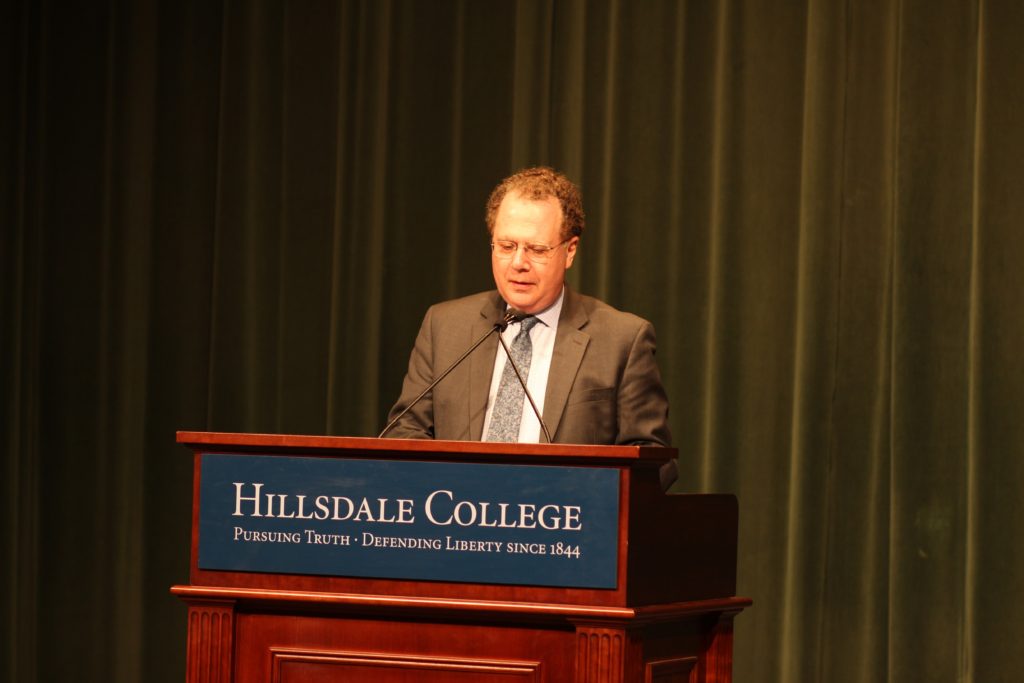David Goldman is best known for the columns he wrote under the pseudonym Spengler for Asia Times. He began using the pen name in 1997 to continue his successful career on Wall Street and in financial consulting for the U.S. government. In 2015, he became part-owner of the Asia Times. On Tuesday, the Eugene C. Pulliam Distinguished Fellow in Journalism gave a talk at Hillsdale College titled “The Echo Chamber of Main Stream Media.”
Were you aware of crony capitalism when you worked on Wall Street?
Oh, I think the industry is thoroughly corrupt, and I left it, because I was asked to do things which I consider to be illegal and even felonious as opposed to simply immoral. Wall Street, for 20 years, made most of its money getting overpaid to supply people with extreme amounts of leverage they shouldn’t have been using by getting around regulations, and the Federal Reserve rubber-stamped it, and the bank examiners at the Treasury rubber-stamped it, and that got us into the 2008 financial crisis. I think everyone on Wall Street knew they were doing something wrong. They knew it would come to a horrible end, but they hoped they would get their bonuses out of it and cash in their restricted stock before the end came.
What was behind the invention of Spengler?
I got interested in the intersection of theology and politics. Now, that’s not really a controversial statement, because if you have religious wars, fought on the large scale, certainly theology and politics have a great deal to do with each other. If you’re in politics, you may not be interested in theology, but theology is interested in you. So the question that fascinated me: Why do you see persistent self-destructive behavior on the part of very large groups of people, entire countries, political movements, religious movements, and so forth? And what was the meaning of 9/11? What did it mean to have very large numbers of people who were willing to commit suicide in order to inflict damage on the civilians of other countries? To my knowledge, this has never happened before in all of history. It really is a new and terrible thing. So what kind of despair, what kind of perverse mental process goes into a decision to sacrifice so many lives to hurt civilians on the other side? This is not simply a clash of civilizations; this is a civilizational death wish, which really requires a different kind of evaluation. So some of the theology I’ve been studying, particularly that of Franz Rosenzweig, a great German-Jewish theologian of the World War I era, I thought gave me better tools to understand what was going on with these religious wars. I began writing about it just to get some ideas off my chest with no anticipation that anybody would be interested in such abstruse material. To my complete shock and dismay, the columns became very popular. So I was asked to keep writing them, and I did.
What’s the most important thing for Hillsdale students to know?
I think the most important thing for us to understand as Americas is that we’ve come through a period, between 1945 and 2005, a period of 60 years where the United States simply called the shots. We were the victor in World War II; we dictated terms to Europe and Asia. The Soviet Union challenged us. It was a serious challenge, but ultimately we crushed them in the Cold War, and when communism fell in 1989, the communist system was humiliated and in ruins. So for most of the experience of our parents and grandparents, for most of their lifespan, the United States was what it was. We are not alone any more. We share this world. We still should be the No. 1 power in the world, but it’s not going to be as easy as it was in the past. I think we’re going to have to reach deep into the roots of American innovation and ingenuity and optimism and invention and understand what made America great in the first place in order to continue to be great.

